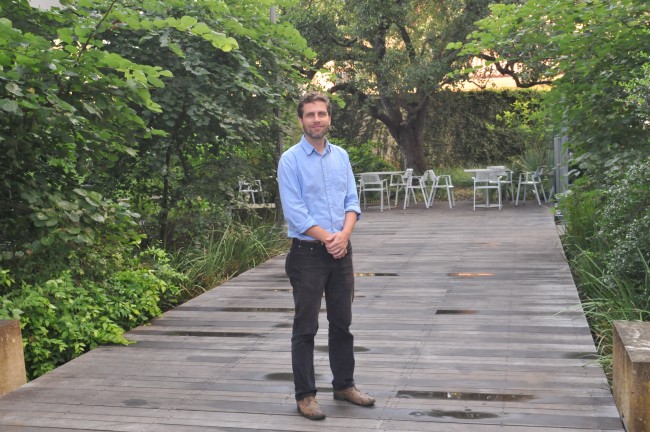Writer-In-Residence: Adam Papendieck
October 12, 2016

By Adam Papendieck
This fall I will begin my second year as the Jackson School’s Writer-in-Residence, a forward thinking position funded by alumni and friends through the Jackson School’s Writer-in-Residence Endowment and the Elias Sellards Writer-in-Residence Fund.
Strong writers in the geosciences are urgently needed, as are communicators who are able to collaborate across increasingly complex academic and industrial landscapes. We’re taking a holistic, research-based approach to the development of effective writers and communicators, moving beyond traditional one-size-fits-all writing instruction towards a highly personalized program rooted specifically within
geoscientific disciplines.
Since its publication in 1959, William Strunk Jr. and E. B. White’s classic The Elements of Style has been prescribed to suffering writers of all types, ages and afflictions. That said, having owned a copy for over a decade, it was only upon arriving at the Jackson School last year I actually sat down to read it cover to cover. It’s a good book: short, efficient and full of snappy aphoristic tidbits like “write with nouns and verbs” and “omit needless words.”
It’s also an old, strange and frequently misleading book. Steven Pinker, a cognitive psychologist from Harvard, points out that the stylistic gems in The Elements are set amidst outdated trivia, questionable generalizations and some straight-up bad advice: “the word people is not to be used with words of number in place of persons.” Perhaps most importantly, it is not quite clear how the book should be used by writers.
It’s not a standard, reference in the vein of the MLA Handbook or Chicago Manual of Style. Neither is it a beach read. For many of us, the book may be less a reference or guide, and more a talisman which we place on our bookshelf to ward off evil writing spirits and pedants.
In the end, I think we simply expect far too much of this 85-page, 57-year-old booklet. The truth is that writing is a skill which, first and foremost, takes practice. Style varies from discipline to discipline, and our conception of “good” writing evolves as our language and culture evolve. David Russell, an influential professor of rhetoric and writing at Iowa State, draws an analogy between ball skills and writing skills to highlight how important it is to develop both athletes and writers within the specific games that they aspire to play.
We would never expect to improve the performance of our football, basketball and volleyball players by enrolling them all in a general course called “Ball Skills.” Neither should we expect general writing guides or courses to have a significant impact on disciplinary writing performance.
At the Jackson School, this means that students must practice writing in geoscientific genres. Educational researchers and learning scientists increasingly emphasize how we work and learn together in interdependent ways, and how important it is to develop students in communities of practice which resemble and overlap with the communities they intend to join as professionals. Through a process of synthesis and feedback, students develop characteristically geoscientific ways of knowing, seeing and working in the world. Learning scientists call this disciplinary perception, and in sports we call it things like downfield vision and court vision.
Just as a quarterback learns to see the field through repetitive snaps and feedback from players and coaches, so does a young writer acquire disciplinary ways of seeing, knowing and communicating scientifically through cycles of drafting and feedback from peers and experts. At the Jackson School, I work to make sure that students have a variety of significant opportunities to practice writing together.
Over the summer we launched the Jackson School Blog, a student-driven writing initiative focused on communicating scientific activity at the Jackson School to broad audiences. I also work with faculty to proliferate writing and peer review activities throughout the core geosciences curriculum. I catalyze student writing groups and demand driven communications workshops around real documents and scientific work, focusing for instance on specific fellowship proposals, conference presentations and posters for research symposia. I also meet individually with students to talk about goals, audience and what their piece of writing should do.
I connect them with genre-specific resources, offer feedback on style, grammar and argumentation, and help them prioritize their time and energy as they iterate through drafts. Rather than handing them Strunk and White, I like to help them identify model writers in their field who they can emulate in form and style.
Above all, I try motivate student writers. Writing is hard, and while talent may be helpful to athletes and writers alike, cultivating a dedication to practice is the only way to master the game
Back to the Newsletter
